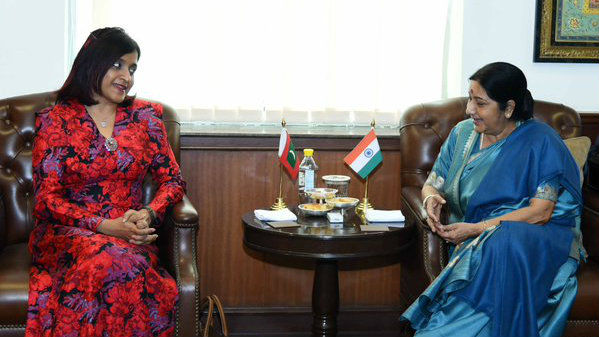Maldives foreign minister in India amidst continuing scrutiny
The two day visit comes ahead of a crucial Commonwealth heads of government meeting later this month, and follows a joint statement by the Prime Ministers of UK and India, emphasizing the importance of “a stable and inclusive democracy in the Maldives, including an independent judiciary.”

22 Nov 2015, 09:00
Minister of Foreign Affairs Dunya Maumoon called on her Indian counterpart Sushma Swaraj in New Delhi on Saturday amidst continuing scrutiny on the Maldives following fresh political turmoil.
The two day visit, aimed at “strengthening bilateral ties,” comes ahead of a crucial Commonwealth heads of government meeting later this month, and follows a joint statement by the Prime Ministers of UK and India, emphasizing the importance of “a stable and inclusive democracy in the Maldives, including an independent judiciary.”
The Maldives was plunged into fresh political turmoil when a minor blast rocked President Abdulla Yameen’s speedboat in September. His deputy has been arrested on suspicion of masterminding the alleged bomb attack, and the defence minister and police chief have been sacked in a shakeup of the security forces.
Yameen also declared an unprecedented nationwide emergency in November, citing fear of imminent attacks.
Become a member
Get full access to our archive and personalise your experience.
Already a member?
Discussion
No comments yet. Be the first to share your thoughts!
No comments yet. Be the first to join the conversation!
Join the Conversation
Sign in to share your thoughts under an alias and take part in the discussion. Independent journalism thrives on open, respectful debate — your voice matters.




